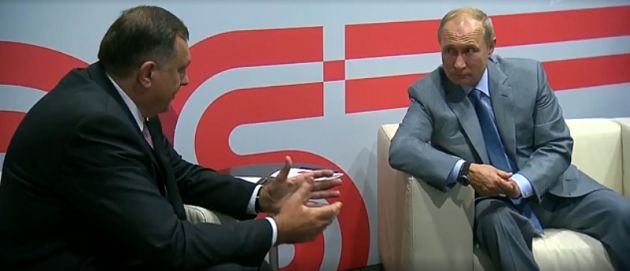Photo: Vladimir Putin and Milorad Dodik
Events in the Balkans continue to move rapidly in an increasingly confrontational direction. Last weekend, Serbia and Kosovo came to the brink of a new war. After Kosovo President Hashim Thaci visited the Bernjak border crossing accompanied by Kosovo special forces, Belgrade accused him of wanting to surround the Ujman/Gazivode reservoir, the banks of which are on the territory of both countries. There were no real grounds for this, especially since the 60 special forces that accompanied the president were incapable of surrounding such a large lake. Nevertheless, Serbia declared its armed forces to be in a state of full combat readiness. And at the end of the same day, its president, Aleksandar Vucic, flew urgently to Moscow – according to several media reports – to request new weapons from Russia.
Meanwhile, another, much more controversial Serbian figure, with whom Vucic barely missed crossing paths, had already visited Russia – the president of the so-called Republika Srpska within Bosnia and Herzegovina, Milorad Dodik. However, he flew not to Moscow, but to Sochi, where he was received by Vladimir Putin, who wished him success in the upcoming October 7 elections in Bosnia and Herzegovina. In general, wishing success to one of the participants in an election in a foreign country does not look very polite towards that country. But in this case, it looks like blatant incitement to war – after all, Dodik, who leads the so-called Republic of Srpska, has repeatedly announced his plans to hold a referendum on secession from Bosnia and Herzegovina. The authorities of Bosnia and Herzegovina responded that this would be tantamount to declaring a new war, since during the last war Serbian chauvinists created this “Republic of Srpska” through mass murder and expulsion of Muslims, who constituted a majority in many parts of it.
As Putin noted during the meeting, 75% of the trade turnover of this so-called “republic” now depends on Russia. This is not surprising, since the international community has long imposed sanctions on it, and many countries have officially sanctioned Dodik, who is persona non-grata in Western capitals. But it is he who Putin wants to win the elections, knowing full well that it will most likely lead to a new war. Is it surprising, then, that Dodik sees Putin as his savior? “Your principled position on the situation in Bosnia and Herzegovina has always helped us, because others do not behave in such a principled way, especially Westerners,” he said during the meeting.
So we can conclude that while the President of Serbia comes to Moscow to ask for military assistance, Putin openly calls for the implementation of a scenario leading to a new military conflict in the Balkans. These are dry facts – they do not require much commentary.

